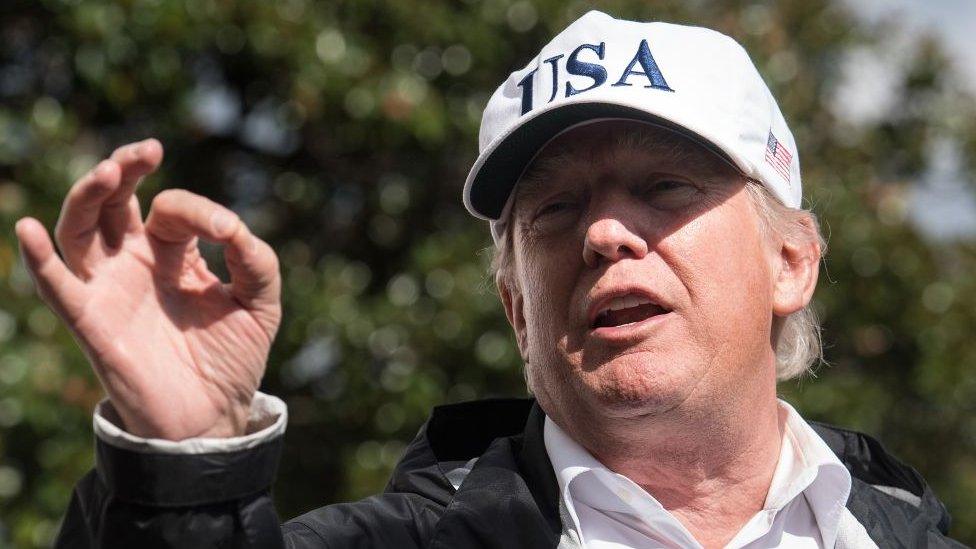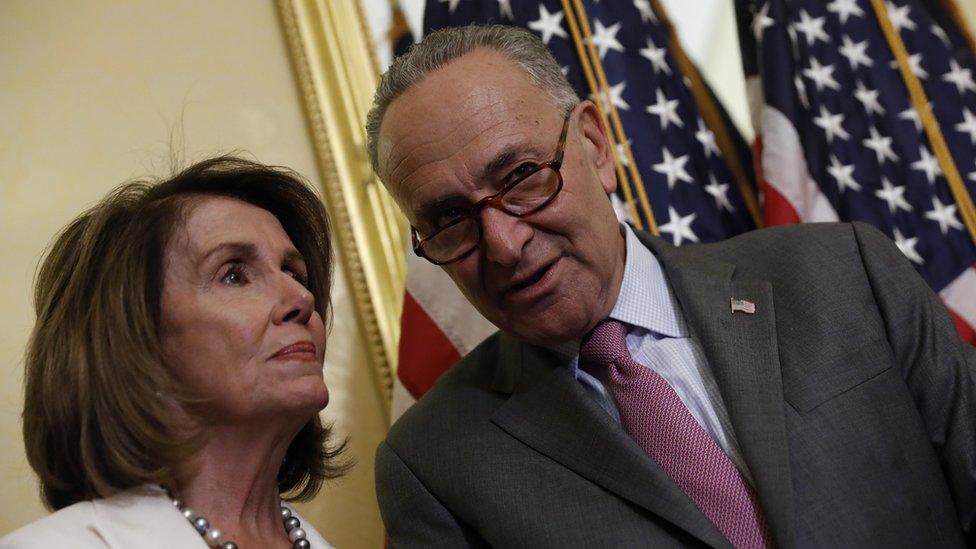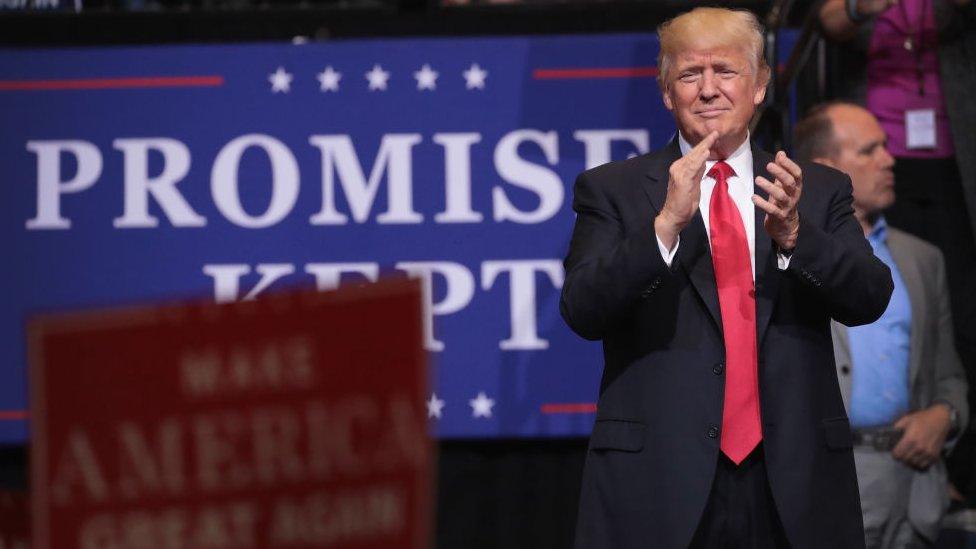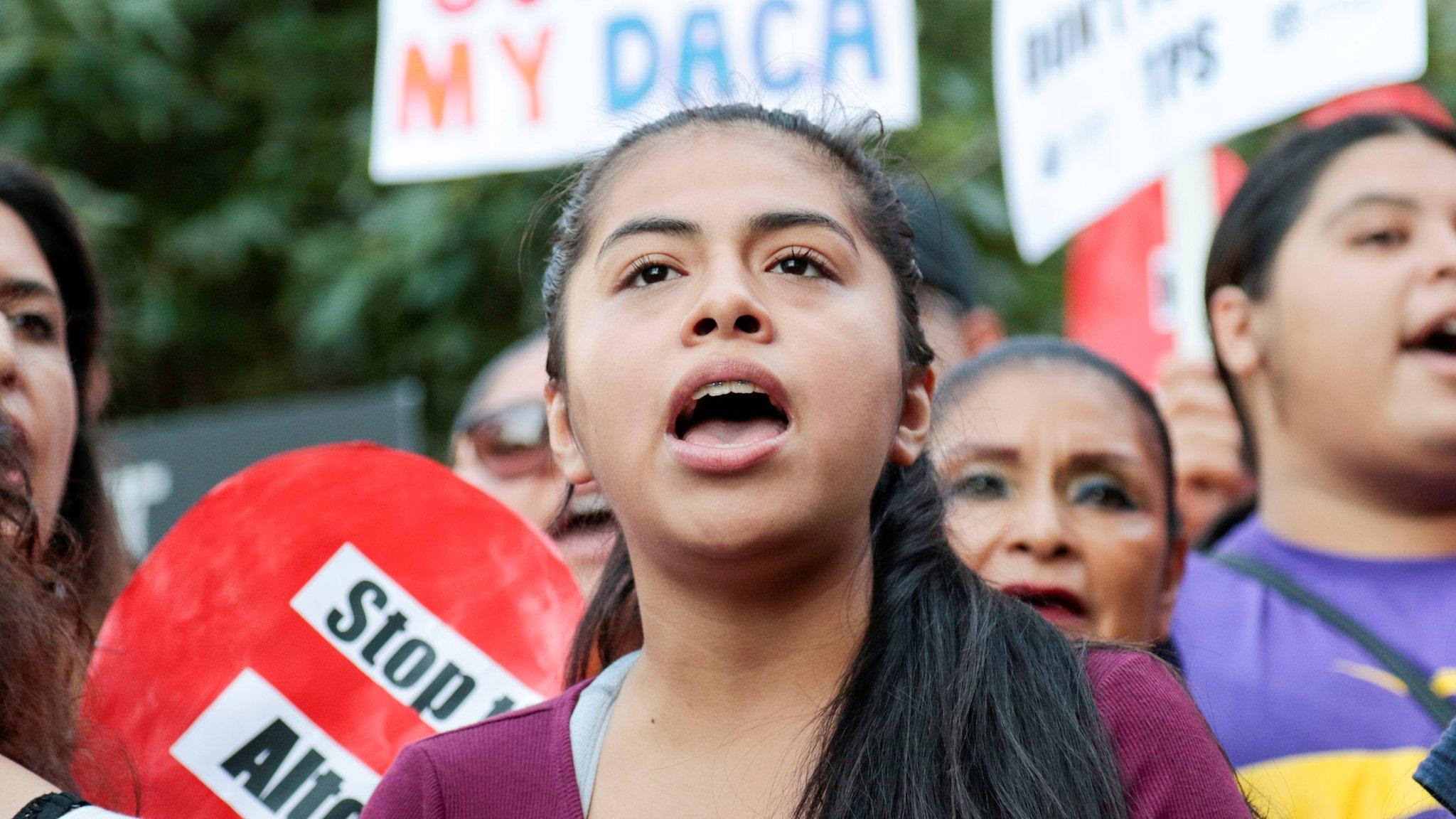Decoding Trump's Daca dalliances
- Published

One of the concerns expressed by White House aides, on background and in whispers, is that the president has a tendency to agree with whoever has spoken to him most recently.
Democratic congressional leaders Nancy Pelosi and Chuck Schumer had that opportunity on Wednesday night, and now there's a tentative agreement to give some sort of normalised immigration status to individuals who entered the US illegally as children in exchange for strengthened border security.
Maybe.
It depends on whether you believe what the president tweeted at 6:11 am, external Washington time or 6:28 am, external. Or what his White House aides told the press on Wednesday night, later Wednesday night or Thursday morning. Or what the president told reporters when he left the White House for Florida or what he said to reporters once he got there.
If this is an example of Mr Trump's free-wheeling negotiating technique, a master class in the "art of the deal" when the president no longer feels compelled to march in lockstep with congressional Republicans, then buckle up. The rollercoaster is only just beginning.
Win-win for Democrats
The easiest part to figure out is what Democrats hope to get out of this. For Ms Pelosi and Mr Schumer, it's a win-win situation.

Democrats Nancy Pelosi and Chuck Schumer are on favourable terrain
If they enshrine protections for those covered by the Obama-era Deferred Action for Childhood Arrivals programme in legislation - something Republicans blocked them from doing back in 2010 - that's a huge victory. The framework for such a deal - the so-called DREAM Act in exchange for increased border security - was essentially what the Democrats were pushing seven years ago.
If the effort is derailed by recalcitrant congressional Republicans or presidential mind-changing, they will have driven a big wedge between Mr Trump and Republicans in Congress and between Mr Trump and anti-immigration activists who were some of his most vociferous supporters during the campaign. The plight of the Daca participants - with whom a majority of Americans sympathise - will become a hot political issue in the months before the 2018 midterm congressional elections.
Ms Pelosi Thursday comments that she "trusts Trump's sincerity" on the issue is just throwing a bit of petrol on the fire.
In the end any fight will take place on terrain friendly to Democrats - over the fate of a sympathetic group of young immigrants, many of whom have only known the US as home. It's a fight they will win, one way or another.
Win-lose for Trump
The president's objectives are a bit murkier. After condemning Barack Obama's executive immigration action on Daca and demagoguing undocumented immigrants as rapists, murderers and drug-dealers through much of the campaign, he's now mouthing Democratic talking points on the topic.
He praises, external Daca recipients as "good, educated and accomplished young people, some serving in the military" - despite the fact that the military service, the education and the accomplishments were largely made possible by Obama actions that Mr Trump had called unconstitutional.
Then there's the question about whether his border wall is part of this deal. It's been the stated administration position for days that the oft-promised beautiful wall will be negotiated separately. The president himself seemed to endorse this in comments as he was leaving the White House for Florida Thursday morning and when he tweeted that it was already being built (or, rather, renovated).
By the time he landed in Fort Myers, however, the presidential rollercoaster had swerved, as he said that any Daca legislative agreement would have to be accompanied by a promise to fund the wall shortly thereafter.
"If we don't have a wall, we are doing nothing," he said. "The wall to me is final."

Daca negotiations are testing Mr Trump's promise to quickly build a Mexican border wall
Given that Wednesday night's confab with the Democrats comes on the heels of last week's deal with Democrats to authorise government debt and avoid a government shutdown, there's the possibility that the president is legitimately attempting to find common ground with his political opponents.
The day after that debt and budget deal, Mr Trump reportedly called Ms Pelosi to rave about the good press they'd been getting. Despite the president's penchant for journalist-bashing, he clearly watches - and craves - the warmth of mainstream media praise.
If the president successfully shepherds through a Daca deal in exchange for border security funding, it could be his Nixon-in-China moment, where only a man who campaigned vociferously against undocumented immigrants could give legal residency to hundreds of thousands of them.
Before Mr Trump hopes too strongly for such an outcome, however, it's worth remembering that while Nixon's efforts were widely heralded, he also alienated some of his most steadfast supporters by breaking bread with Chinese communists.
National Review publisher William Rusher called it "one of the greatest double-crosses of all time". And the media talking heads and Democrats who were singing the president's praises in 1972 were lining up to back his impeachment two years later.
Conservative confusion (and anger)
Reaction amidst the Republican ranks to Mr Trump's non-agreement agreement range from confusion to shock to outrage.
Party elders in Congress have responded with measured words. Speaker of the House Paul Ryan said there is no deal - and that negotiations haven't even begun. Senate Majority Leader Mitch McConnell released a statement that boiled down to: "Well wait and see".
Senator Chuck Grassley of Iowa, chair of the Judiciary Committee, penned a tweet, external that dripped with frustration, saying that the president's deal with Mr Schumer "undercut" his efforts for a bipartisan agreement.
Another member of the Iowa congressional delegation, firebrand Congressman Steve King, gave voice to the anger many of Mr Trump's passionate anti-immigration supporters were feeling toward the president.

Steve Bannon's Breitbart has been quick to accuse Trump of betrayal on the immigration issue
"The base will leave him - they can't support him anymore," he said. "What right do law breakers have to make demands from the citizens of the United States of America?"
Whether a Trump who deals on immigration issues will be the last straw for a base that has stuck by him through peak and valley over the past two years is far from certain, however.
While hard-right conservative media outlets like Breitbart.com, whose once and current publisher Steve Bannon until recently worked down the hall from the Oval Office, have sounded the alarms on the president's softer immigration line, even among his supporters there are mixed feelings.
According to a recent HuffPost/YouGov survey, external, 30% those who voted for Mr Trump for president support a law granting Daca-like protections, while 44% were against.
Perhaps the biggest tell that Mr Trump may feel he is on unstable political ground after his Daca dalliances is that by Thursday afternoon he was tweeting about Bernie Sanders's healthcare plan and his attempts to talk to Mexico's president, and touting to reporters that "many people" now agree with his both-sides-are-to-blame response to the violence at a white supremacist march in Charlottesville.
It's a classic Trump as Squid response. When threatened, shoot a cloud of rhetorical ink and head in a different direction.
The political challenges posed by his decision to end the Daca protections almost certainly will prove as difficult to avoid as they are to overcome, however.
- Published13 August 2017
- Published4 September 2017

- Published13 August 2017